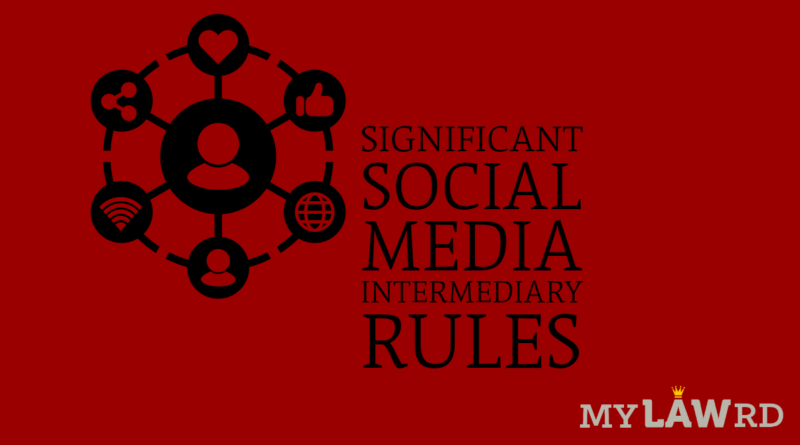Significant Social Media Intermediaries & Additional Due Diligence
In accordance with the new Information Technology (Guidelines for Intermediaries and Digital Media Ethics Code) Rules, 2021, the Central Government now has the power to notify intermediaries as ‘significant social media intermediaries.’ The government would notify intermediaries as such based on a threshold of users. Apart from the key due diligence guidelines, a significant social media intermediary (“significant intermediary”) would have to abide by some additional guidelines.
Appointment of a bunch of officers
Chief Compliance Officer
The Chief Compliance Officer shall be an employee of the significant intermediary and shall be responsible for ensuring compliance with the Act. The rules say that such an officer ‘shall be liable’ for any proceedings where he fails to ensure due diligence as per the rules.
Nodal Officer for Contact with law enforcement agencies
Such an officer shall be available to coordinate with law enforcement agencies 24X7. The officer would ensure compliance with government requests and order in accordance with the rules.
Resident Grievance Officer
The Resident Grievance officer has to be an Indian resident with an Indian passport. The officer would ensure compliance with the provisions of Rule 4(1) (n)- publication of the details of grievance officer as well as a mechanism using which a user may make a complaint against violations of the due diligence rules.
Periodic Compliance Reports
A significant intermediary would need to publish a compliance report every month . The report would mention the details of the complaints received and action taken on them, and the number of links or parts of information the significant intermediary has removed.
Identification of the first originator
A significant intermediary providing services primarily in the nature of messaging shall enable the identification of the first originator of the information. However, any significant intermediary would be required to do so only as per an order passed by a competent court or as per an order under Section 69 of the IT Act read with Information Technology (Procedure and Safeguards for interception, monitoring and decryption of information) Rules, 2009. Further, such an order shall only be passed for actions in cases with a prescribed imprisonment of not less than five years. It is to be noted that the rules lay down that the significant intermediary, in such cases, would not be required to disclose the contents of any electronic message or any other information related to the first originator.
Proactive identification of porn and child porn
Significant social media intermediaries shall endeavor to deploy technology based solutions to proactively identify information that depicts any act or information that depicts an act of rape or child sexual abuse. However, such a solution must respect the freedom of speech as well as the right to privacy of users.
It is to be noted that the Hon’ble Supreme Court in the Prajjawala case had observed that the Government of India may frame necessary guidelines to eliminate child pornography, rape, and gangrape imageries, and videos from social media platforms. Following the decision, an Ad-hoc committee of the Rajya Sabha had laid its report on 03/02/2020 and recommended for enabling identification of the first originator of such contents.
For more on child pornography, you can read this.
Voluntary user verification
A significant intermediary shall enable a mechanism for Indian users to verify their accounts. The platform shall provide such a verified user with a demonstrable and visible mark of identification which shall be visible to all users of the service.
Mechanism to remove content
The significant intermediary, as discussed earlier, must appoint a resident grievance officer. The rules require that an intermediary shall prominently publish the name and contact details of a Grievance Officer. Additionally, it shall also publish a grievance redressal mechanism using which a user can make a complaint against violation of the due diligence rules. Such an officer would need to acknowledge the complaint within three working days and resolve it within a month.
The rules also discuss about sharing the details of any action taken with the originator of the information. The intermediary shall provide such an originator with an adequate and reasonable opportunity to dispute the action taken by it. The originator can also request reinstatement of the information.
The government on February 26, 2021, notified that intermediaries with more than 50 lakh users registered in India would be considered as a significant social media intermediary.
Importantly, the rules also talk about an OTT grievance redressal mechanism.
Do subscribe to our Telegram channel for more resources and discussions on tech-law. To receive weekly updates, don’t forget to subscribe to our Newsletter.
You can also follow us on Instagram, Facebook, LinkedIn, and Twitter for frequent updates and news flashes about #technologylaw.

